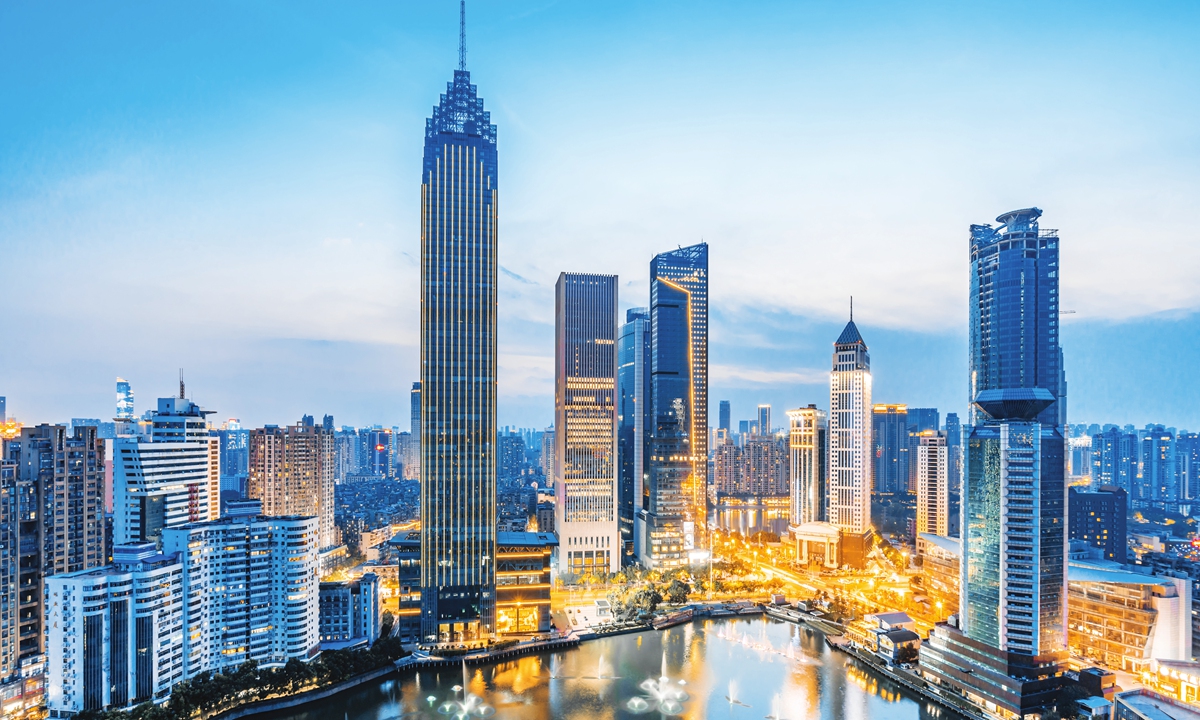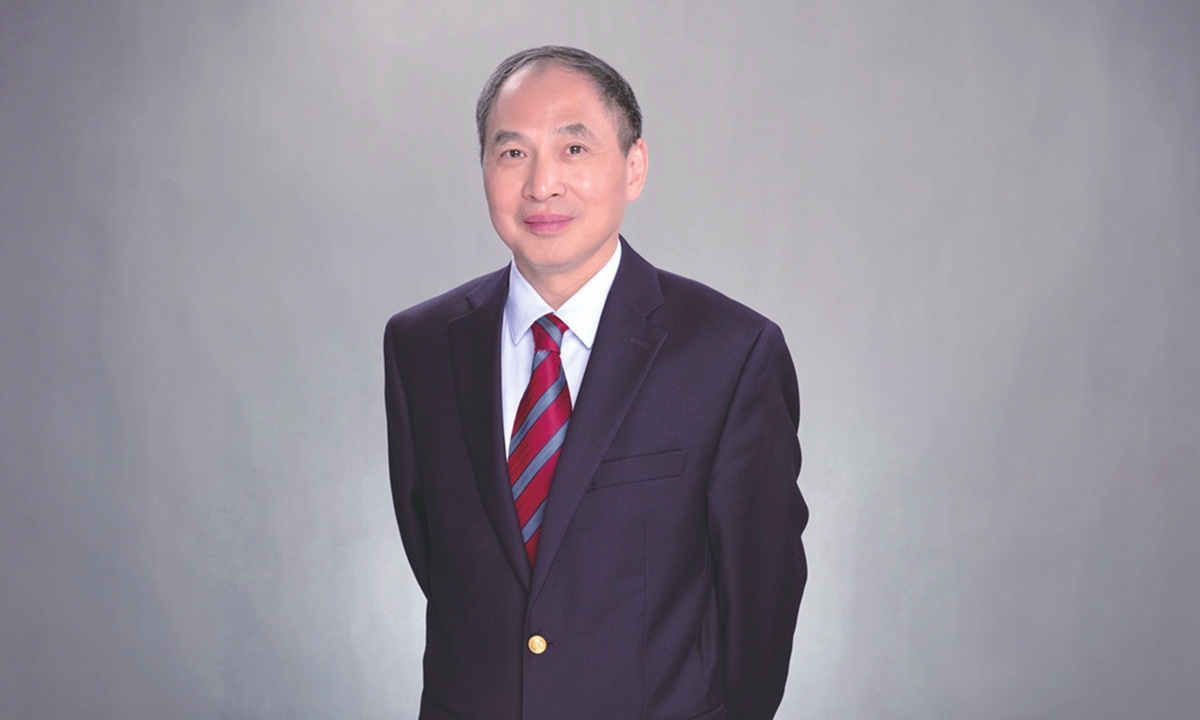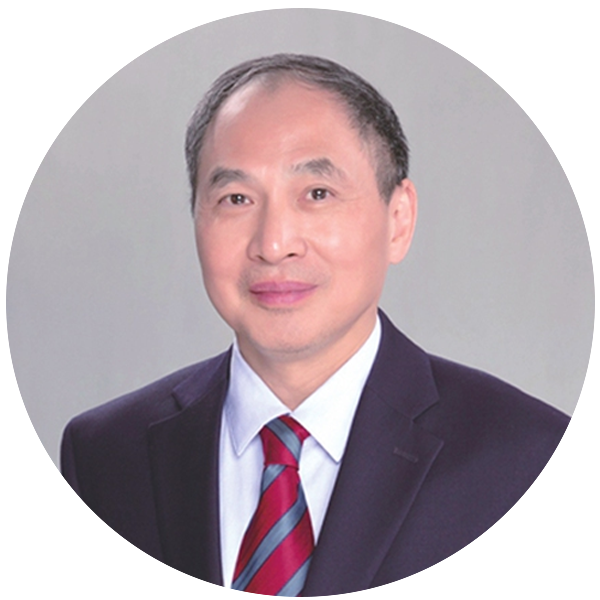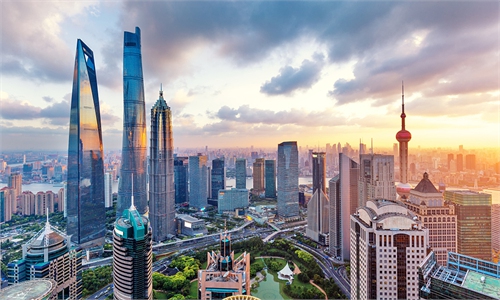CPC leadership an important prerequisite for Chinese modernization: Zheng Yongnian

Evening scenery of CBD buildings in Northwest Lake, Hankou, Wuhan Province. Photo: VCG. Photo: VCG
Editor's Note:
The report delivered to the 20th National Congress of the Communist Party of China (CPC) emphasized that China has proposed promoting national rejuvenation through a Chinese path to modernization. This has made "Chinese modernization" a hot phrase in international public opinion. How has the CPC been able to promote the realization of Chinese modernization? And what is the significance of the 20th CPC National Congress to China and the world? Global Times (GT) reporter Wang Wenwen talked to Zheng Yongnian (Zheng), professor at the Chinese University of Hong Kong (Shenzhen), and president of the Institute for International Affairs, Qianhai, over these issues.
GT: What do you think is the most distinctive feature of "Chinese modernization"? How is Chinese modernization different from Western modernization? How has the CPC been able to promote the realization of Chinese modernization?
Zheng: The CPC leadership is an important prerequisite for Chinese modernization.
We should pursue modernization, but what we seek is not modernization to the benefit of a minority, but to the benefit of the majority. Therefore, we talk about modernization for common prosperity. Since modern times, China's pursuit of modernization has gone through ups and downs. China was defeated by the UK in the two Opium Wars, and then by Japan in the First Sino-Japanese War. Before reform and opening-up in the late 1970s, the Four Modernizations we talked about emphasized material aspects. Now we have surpassed this stage, we must comprehensively promote modernization at the spiritual level, as well as the material and institutional levels.
Why should Chinese modernization emphasize the leadership of the CPC? China's modernization is modernization under the leadership of the CPC, which stands for common prosperity for all, and at both the material and spiritual levels. China, as the second-largest economy in the world, can achieve modernization. The political will of the CPC is also very important.
Look at what is going on in the UK recently. With the advancement of modernization and globalization, many problems will emerge in social and economic sectors as well as foreign and internal affairs, which need to be addressed by an effective government. In Europe and the US, where an effective government itself has become a problem, everyone has become pessimistic about the future.
The 20th CPC National Congress has revealed a strong and powerful political party and its leadership. Only a competent and stable ruling party and government can promote modernization and digest the potential negative effects that would come along with modernization.
There is Chinese modernization. There is also American modernization, European modernization, Japanese modernization, Singaporean modernization and others. We hope that all countries can find modernization that suits their own cultural and national conditions. We will never impose our path to modernization on others, otherwise we will not call it Chinese modernization. This is different from the US. The West and the US always want to impose their own paths to modernization as well as economic and political systems on other countries. Chinese modernization has provided a choice for countries which long for both development and independence, but we are not exporting our path. We hope these countries can find a modernization path that suits themselves.
GT: The CPC has launched an unprecedented battle against corruption over the past 10 years. It has resolved to "offend a few thousand rather than fail 1.4 billion" and pledged to persevere with self-reform to ensure that it will never change its nature, its conviction or its character. In contrast, in the West, which believes the CPC has no error-correction mechanism, political parties often veto each other and have no courage and responsibility to make decisions. What's the reason for such a contrast?
Zheng: A ruling party of a society has two destinies, either to be reformed by revolution, that is, to be overthrown, or to avoid being revolutionized through self-reform. The West thinks the rotation of parties can solve this problem. But now, with a shrinking middle class and an increasingly divided society, the rotation of ruling parties has become not only overly frequent, but also more and more violent. That's the reason why the Capitol riots broke out in 2021. The rotation of power in the UK has also become increasingly populistic. The CPC, instead, has chosen a different path, that is, self-reform. Since the 18th CPC National Congress, we have built tight the cage of institutions that prevents corruption. The most important thing is the establishment of China's inspection and supervision systems.
Western checks and balances have failed to prevent mistakes. Since the Gulf War, the US has not stopped being involved in wars. The West claims that the CPC has no error-correction mechanism, but China has not made any major mistakes since the reform and opening-up. And precisely because of this, China has achieved modernization in 40 years which took the West for more than 150 years to achieve.
Our policies are continuous but dynamic. From Mao Zedong Thought, Deng Xiaoping Theory to the Theory of Three Represents, and the Scientific Outlook on Development, to Xi Jinping Thought on Socialism with Chinese Characteristics for a New Era, there are both continuity and innovation. We have kept going forward.

Zheng Yongnian Photo: Courtesy of Zheng
GT: As shown in the report delivered to the 20th CPC National Congress, China has maintained consistency and continuity in its major foreign policies. How has this contributed to the certainty of the world in changes? What are the implications for developing countries?Zheng: Great powers are the stabilizing forces of international politics, and an effective international order is itself an international public goods. Major powers must play a far bigger role than smaller countries. Therefore, the foreign policies of big countries should have continuity. If they constantly change, it will be difficult for smaller countries to gain benefits.
China has been stronger and has succeeded in modernization, but it will not impose its own system on other countries as the US has done. China is not the US and will never become the US. It has sent a message to other developing countries that China is a global force for peace and development. China's success will also provide these developing countries with the possibility to achieve modernization while maintaining independence.
GT: "Holding dear humanity's shared values of peace, development, fairness, justice, democracy, and freedom" has been written into the revised CPC Constitution. What is the essential difference between these values and the so-called universal values of "freedom, democracy, human rights and fraternity" advertised by the West?
Zheng: Theoretically the West believes that these values are innate in human beings and all human beings are created equal. It sounds great on the surface, but it's not. Chinese civilization recognizes these values, but believes these values must be achieved through development.
The West calls them universal values, therefore the West seeks to impose its "democracy and freedom" on others, just as shown in the US' Greater Middle East Initiative. China believes democracy, freedom, development and peace can only be achieved through the efforts that every country, society, group and people would make. These cannot be imposed on others, and in fact the West has seldom succeeded in doing so.
GT: In our previous interview, you said the 18th CPC National Congress has made China's path to modernization clearer and more mature and also provided a possible choice of model for developing countries that seek both development and political independence. If we reevaluate the 20th CPC Party Congress five years later, how do you comment on its significance to China and to the world respectively?
Zheng: Our definition of modernization is progressive. What we are offering now is a higher-standard modernization. Modernization itself will not be interrupted, and we don't have the concept of "the end of history."
We will not be satisfied with the status quo, and we will always pursue progress. Therefore, the CPC is a mission-oriented party. The CPC has not only made contributions to the entire country and the entire Chinese nation, but also contributed to the world. It is a force that not only hedges against some forces advocating confrontation in the international community, but also gives other countries a choice.
The US is targeting China, but why haven't we moved toward a cold war similar to the one between the US and the Soviet Union? Because China has the confidence and capabilities to avoid being led by the nose by the US or other radical forces. When the US asked Southeast Asian countries to take sides, China did not do so. "A strong country will seek hegemony" is the logic of the West, not China's.
GT: The closing session of the 20th CPC National Congress adopted a resolution on an amendment to the Constitution of the Communist Party of China (CPC), which included "resolutely opposing and deterring separatists seeking 'Taiwan independence.'" What messages does this convey? How do you see the CPC's strong determination, firm will and strong capability to realize the reunification of the motherland in the new era?
Zheng: The Constitution of the CPC represents the will of the Chinese people. As I said before, if there is a conflict between China and the US breaking out in the Taiwan Straits, China represents the will of the whole nation, but whose will does the US represent? Some Americans mistakenly believe that the reason why China wants to solve the Taiwan question is that China hopes to compete with the US for hegemony and drive American power out of the Western Pacific. The truth is, the resolving of the Taiwan question is a matter of national reunification for China. China's ruling party must reflect the will of the entire nation.




